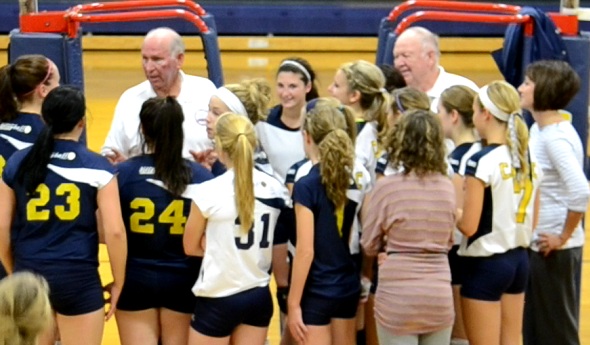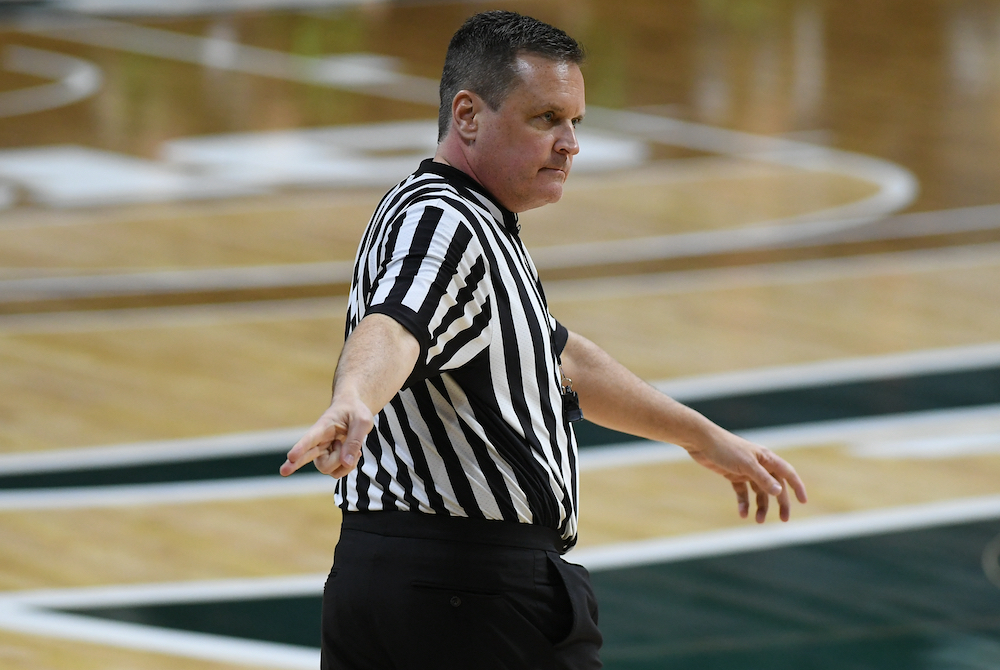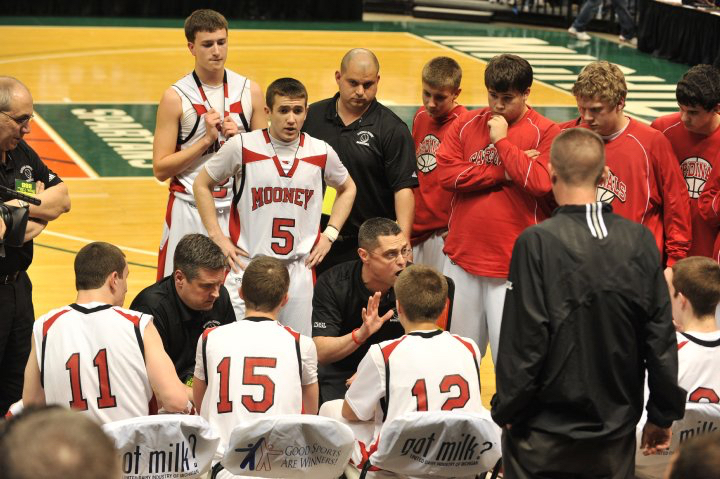
90 Years of Making the Right Calls
November 7, 2012
By Geoff Kimmerly
Second Half editor
Beryl Hager read something about officiating recently that struck him.
People will never forget a bad call, and they’ll never remember a good one.
“That’s the way it is,” the longtime official from Marlette said. “Realistically, everyone makes a bad call.”
But the calls, good and bad, are not what Hager and longtime partner Vern Geister will remember most from their combined 90 years in Michigan high school athletics, which "tentatively" came to an end this fall.
The former high school classmates have a standing dinner double date with their wives. When that time comes, they’ll each celebrate more than four decades as MHSAA officials, including many years working side-by-side on the football field and most recently the volleyball court.
Hager, 74, has been an official since 1967 – a stretch of 46 years. Geister, 81, served his 44th this fall.
Frequently working five days a week over the decades, they've facilitated hundreds of games and benefited thousands of athletes, mostly in the Thumb area. They've officiated Capac’s volleyball invitational over the tenures of three athletic directors. Hager worked basketball games in the school’s Harry C. Moore Gymnasium when Moore was the basketball coach – Moore died in 1986.
“They have just great attitudes. They’re always wonderful with our kids,” Capac athletic director Arnie VandeMark said. “And you just wouldn't believe the stories they told us. They've been here a long time.”
A book full of memories
Hager wishes he’d kept a diary of his officiating career, which began in 1967.
Some of his most vivid memories are perhaps not what you’d expect.
“I saw some dreadful injuries,” he said. “I saw a young man break a thigh bone, and he was in shock and didn't feel any pain. One night at a volleyball match, a girl broke her ankle, came down on somebody’s foot. One night at a basketball game, two guys were playing and one jumped up and the other was behind him, trailing him, and four teeth went flying through the air. The front one came down on his back, the other came down on his face. Both were out.”
But the far greater number of his football, basketball, volleyball and baseball games were without incident – just as an official would have them.
Hager always enjoyed sports. He was involved in Little League baseball and has taught Sunday school at his church for 55 years. Officiating seemed a great way to blend his enjoyment of sports and people.
Plus it worked into his schedule. He could pick up games that didn't conflict with his jobs in farming and later facility maintenance. His son graduated in 1983, and aside from one half of one football game, he didn't miss an event. For a short while at the start, Hager's his wife Lois officiated with him.
He also was among pioneers in one of his sports, officiating volleyball from its MHSAA start in 1976. He’s worked a number of District tournaments and a handful of Regionals over the years – and like many things over 45 seasons, watched that sport come a long way.
“I didn't know anything about it. Nor did anyone else,” Hager said. “It’s changed tremendously in the last 35 years. When we started, if they could get the ball over the net, and hit it back, we were doing really well. Now, one guys told me volleyball is not a game. It’s a science.”
A natural fit
Geister really wanted to coach.
He’d done so for his son’s little league baseball team for five years, but knew his chances to continue were few. At that point in time during the 1950s, nearly all coaches also were teachers.
Before retiring in 1997, Geister worked first in the mobile home industry, then for the Kroger company before serving for more than 16 years as a Sanilac County magistrate. Officiating seemed like the next best way to stay involved with athletics.
“It was kind of a natural thing to get started,” he said.
“I think it makes you feel younger than you really are, just being with the athletes.”
Geister, who had caught for the Marlette baseball team before graduating in 1949, began officiating that sport before picking up football, basketball, softball and eventually volleyball. He got heaviest into that last after a knee replacement in 1997 made it difficult to keep up on the football field and basketball court.
But he did have a chance to officiate at the highest high school level, working the 1983 Class D Football Final at the Pontiac Silverdome between St. Ignace and Mendon. Geister also officiated Semifinals and some high-level baseball playoffs.
One football Regional sticks out most. Elkton-Pigeon-Bay Port and now-closed Detroit DePorres matched up at Flint’s Atwood Stadium. A storm had come through and dropped a good amount of snow. That was cleared, but a sheet of ice was left behind.
Back then, four people made up an officiating crew – now it is five – which would've made keeping up with the players pretty tough. The good news, perhaps, was that the players had a hard time keeping upright on the slippery turf as well.
Remembering a third partner
Geister said for him, the best part of officiating has been the friends he’s had the opportunity to make and maintain over the years.
They'll always remember a third partner who died in 1978.
Classmate Andy McSkulin had been a freshman at Marlette when Geister was a senior in 1948-49 and a senior when Hager was a freshman. He became an MHSAA official around the same time those two started up.
The three did a number of games together and worked on the same football crew at times. They knew each other well before, but got to know each other even better.
Hager has never gotten riled easily, and gave out only a few technical fouls over the years. But he remembered working a basketball game with McSkulin during which his partner knew Hager was about to assess one – McSkulin “said he could see the fire in my eyes.”
More to come?
For the last 15 seasons, Hager and Geister have worked volleyball matches together. They bring a professional but fun atmosphere to their games.
They’re known for joking with each other. They've never had an argument.
And although Geister doesn't completely agree, Hager said he and his partner’s retirement is only tentative. They've discussed coming back for a few junior varsity or junior high games next fall.
Neither belongs to a local officials association or has a computer. But both have still gotten calls from local athletic directors like VandeMark, who appreciate their knowledge and approach in working their games.
“I think what you enjoy is having the respect of the players and coaches,” Geister said. “I think you get to the point where it’s the pride of feeling you've done your best, done a good job and that they appreciate it.”
PHOTO: Officials Beryl Hager (left) and Vern Geister are congratulated by members of the Capac freshman, junior varsity and varsity volleyball teams while being honored for their combined 90 years of service during a match last month. (Photo courtesy of Capac athletics.)

Former Cardinal Mooney Coach Earns Breslin Return as Official
By
Paul Costanzo
Special for MHSAA.com
March 31, 2022
Jim McAndrews felt anxious and excited both times he was on the floor during basketball Finals weekend at the Breslin Center.
 But those feelings were a bit different as an assistant coach at Marine City Cardinal Mooney in 2010 than they were as a referee this year.
But those feelings were a bit different as an assistant coach at Marine City Cardinal Mooney in 2010 than they were as a referee this year.
“It was different because I was worried about myself (as a referee) versus having to worry about high school kids and not making a mistake to screw it up for them (as a coach),” McAndrews said. “This was a little less pressure than that. With refereeing, you kind of just worry about yourself.”
McAndrews served as the head official in the Division 2 Girls Semifinal between Grand Rapids West Catholic and Detroit Country Day on March 18. That Breslin appearance came 12 years after he was an assistant for his brother, Mike McAndrews, during Mooney’s runner-up run in Class D boys in 2010.
He also coached with his sister, Susan Everhart, who led the Mooney girls to the Semifinals in 2008 and a runner-up finish in 2009. Those tournaments ended at Eastern Michigan University, but all of them gave him a rare look at the experience from two very different angles.
“I wasn’t walking in blindly,” McAndrew said. “I think what helps me in my officiating duties is having been there and knowing what the coaches are expecting and what they need. I think that helps me to communicate things to them. Being (at Breslin as a coach) and seeing that helped.”
McAndrews has been reffing since leaving his brother’s staff in 2011. That ended a long run in coaching which started in 1989 when he was an assistant coach at Mooney under Dave Jackson. After one season in that role, he took over the program and coached the Cardinals for a decade. That included coaching his brother, who he would later coach with for another eight years.
It didn’t even take a full season for him to get back on the court, albeit in a different role, after leaving the coaching ranks.
“I missed the game,” Jim McAndrews said. “Refereeing gives you an opportunity to get your competitive juices going a little bit. You get a little exercise, and the relationships you get to make are amazing. There’s nothing like being in the gym and talking hoops with other like-minded people: junkies. Basketball junkies. It’s a community, and it’s a really good community. We all want good stuff for the kids, and we want to help out. Plus, I enjoy seeing the local talent.”
 McAndrews, whose full-time job is in automotive supply sales, refs mostly in the Metro Detroit area and the Thumb, working games in the Catholic League, Macomb Area Conference and Blue Water Area Conference.
McAndrews, whose full-time job is in automotive supply sales, refs mostly in the Metro Detroit area and the Thumb, working games in the Catholic League, Macomb Area Conference and Blue Water Area Conference.
Being a referee has not only allowed him to stay in the game and the high school basketball community, but it’s also introduced him to new people who have the same love for the game.
“This community really is special,” he said. “We’re not in it to get rich. We’re in it because we’re passionate about the game.”
This year’s Semifinal was his first, and he was joined on the court by Jerry Armstrong and Douglas Richardson. It was the trio’s first time together.
“That can be part of the challenge,” McAndrews said. “You have to be able to adapt to other people’s way of doing things that you’ve never met before. That’s part of it. It’s about officiating the game as well as challenging yourself.”
Another challenge of refereeing during Finals weekend is the increase of eyes on the game, and the extra pressure that can bring.
“In this particular case, it was my first time (reffing) on TV,” McAndrews said. “There’s commentators with replays, and there are different responsibilities in regard to timeouts. There was a little anxiety. I said to my partners that I’m just going to try to smile, be in the moment and enjoy it, because it’s been a crazy couple years. But your peers are watching, other referees are watching, and they’ll let you know if you miss something.”
The game went off without any issues, and the experience ended up being even better than McAndrews expected, as his kids were able to be on the court with him.
“It was fantastic,” he said. “I can’t think of a better word for it. My family was able to get involved, and we had first-class accommodations. My kids were able to be the ball boy and the water guy for me, so this wasn’t just for me. We were very appreciative of it all, and it was really, really fun.”
 Paul Costanzo served as a sportswriter at The Port Huron Times Herald from 2006-15, including three years as lead sportswriter, and prior to that as sports editor at the Hillsdale Daily News from 2005-06. He can be reached at [email protected] with story ideas for Genesee, Lapeer, St. Clair, Sanilac, Huron, Tuscola, Saginaw, Bay, Arenac, Midland and Gladwin counties.
Paul Costanzo served as a sportswriter at The Port Huron Times Herald from 2006-15, including three years as lead sportswriter, and prior to that as sports editor at the Hillsdale Daily News from 2005-06. He can be reached at [email protected] with story ideas for Genesee, Lapeer, St. Clair, Sanilac, Huron, Tuscola, Saginaw, Bay, Arenac, Midland and Gladwin counties.
PHOTOS (Top) Jim McAndrews works this season’s Division 2 Semifinals between Grand Rapids West Catholic and Detroit Country Day. (Middle) McAndrews, kneeling lower left, serves as an assistant coach during Cardinal Mooney’s run to Breslin in 2010. (Top photo by Hockey Weekly Action Photos; middle courtesy the McAndrews family.)

